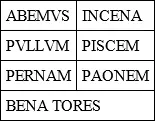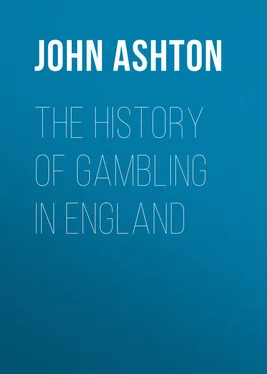John Ashton - The History of Gambling in England
Здесь есть возможность читать онлайн «John Ashton - The History of Gambling in England» — ознакомительный отрывок электронной книги совершенно бесплатно, а после прочтения отрывка купить полную версию. В некоторых случаях можно слушать аудио, скачать через торрент в формате fb2 и присутствует краткое содержание. Жанр: foreign_antique, foreign_prose, на английском языке. Описание произведения, (предисловие) а так же отзывы посетителей доступны на портале библиотеки ЛибКат.
- Название:The History of Gambling in England
- Автор:
- Жанр:
- Год:неизвестен
- ISBN:нет данных
- Рейтинг книги:5 / 5. Голосов: 1
-
Избранное:Добавить в избранное
- Отзывы:
-
Ваша оценка:
- 100
- 1
- 2
- 3
- 4
- 5
The History of Gambling in England: краткое содержание, описание и аннотация
Предлагаем к чтению аннотацию, описание, краткое содержание или предисловие (зависит от того, что написал сам автор книги «The History of Gambling in England»). Если вы не нашли необходимую информацию о книге — напишите в комментариях, мы постараемся отыскать её.
The History of Gambling in England — читать онлайн ознакомительный отрывок
Ниже представлен текст книги, разбитый по страницам. Система сохранения места последней прочитанной страницы, позволяет с удобством читать онлайн бесплатно книгу «The History of Gambling in England», без необходимости каждый раз заново искать на чём Вы остановились. Поставьте закладку, и сможете в любой момент перейти на страницу, на которой закончили чтение.
Интервал:
Закладка:
As far as we know, the ancient Jews did not gamble except by drawing, or casting lots; and as we find no word against it in the inspired writings, and, as even one of the apostles was chosen by lot (Acts i. 26), it must be assumed that this form of gambling meets with the Divine approval. We are not told how the lots were drawn ; but the casting of lots pre-supposes the use of dice, and this seems to have been practised from very early times, for we find in Lev. xvi. 8, that “Aaron shall cast lots upon the two goats; one lot for the Lord, and the other lot for the scape goat.” And the promised land was expressly and divinely ordained to be divided by an appeal to chance. Num. xxvi. 52 and 55, 56, “And the Lord spake unto Moses, saying… Notwithstanding the land shall be divided by lot: according to the names of the tribes of their fathers they shall inherit. According to the lot shall the possession thereof be divided between many and few.” The reader can find very many more references to the use of the “lot” in any Concordance of the Bible. But in their later days, as at the present time, the Jews did gamble, as Disney 3 3 A View of Ancient Laws against Immorality and Profaneness. By John Disney. Camb. 1729.
tells us when writing on Gaming amongst the Jews.
“Though they had no written law for it, Gamesters were excluded from the Magistracy , incapable of being chosen into the greater or lesser Sanhedrim; nor could they be admitted as Witnesses in any Court of Justice, till they were perfectly reformed. Some of their reasons for excluding such from the Magistracy were, that their gaming gave sufficient presumption of their Avarice , and, besides, was an employment no way conducing to the public good : a covetous man, and one who is not wise and public spirited, being very unfit for offices of so much trust and power, as well as dignity. The presumption of Avarice was the cause, also (and a very good one), of not admitting the evidence of such a man. And that other notion they had, that the gain arising from play was a sort of Rapine , is as just a ground for the Infamy which stained his character, and subjected him to these incapacities.
“This last consideration, that money won by gaming was looked upon as got by Theft , makes it reasonable to conclude that such money was to be restored , and that the winning gamester was punished as for Theft : which was not, by their law, a capital crime; but answered for, in smaller cases (and, probably, in this, among the rest), by double Restitution : Exod. xxii. 9.
“But the partiality of that people is evident, in extending the notion of Theft, only to Gaming amongst themselves ; i. e. , native Jews and proselytes of righteousness; for, if a Jew played, and won of a Gentile, it was no Theft in him: but it was forbidden to him on another account, as Gaming is an application of mind entirely useless to human society. For, say the Talmudists, ‘Tho’ he that games with a Gentile does not offend against the prohibition of Theft, he violates that de rebus inanibus non incumbendo : it does not become a man, at any time of his life, to make anything his business which does not relate to the study of wisdom or the public good.’ Now, as this was only a prohibition of their doctors, perhaps the law, or usage in such cases might take place, that the offender was to be scourged.”
Among the Greeks and Romans the first gambling implement was the ἀστραγαλος, or (Lat.) Talus , before spoken of. In the course of time the sides were numbered, and, afterwards, they were made of ivory, onyx, &c., specimens of which may be seen in the Etruscan Saloon of the British Museum, Case N. In the Terra Cotta room is a charming group of two girls playing with Astragals, and in the Third Vase room, on Stand I., is a vase, or drinking vessel, in the shape of an Astragal (E. 804). Subsequently the Tessera, or cubical die, similar to that now used, came into vogue (samples of which may be seen in Case N. in the Etruscan Saloon), and they were made of ivory, bone, porcelain, and stone. Loaded dice have been found in Pompeii. They also had other games among the Romans, such as Par et Impar (odd or even), in which almonds, beans, or anything else, were held in the hand, and guessed at – and the modern Italian game of Mora was also in vogue.
But gambling was looked down upon in Rome, and the term aleator , or gambler, was one of reproach – and many were the edicts against it: utterly useless, of course, but it was allowed during the Saturnalia. Money lost at play could not be legally recovered by the winner, and money paid by the loser might by him be recovered from the person who had won and received the same.
The excavations at Pompeii and other places in modern times have revealed things not known in writings; and, treating of the subject of gambling, we are much indebted to Sig. Rodolfo Lanciani, Professor of Archæology in the University of Rome. Among other things, he tells us how, in the spring of 1876, during the construction of the Via Volturno, near the Prætorian Camp, a Roman tavern was discovered, containing besides many hundred amphoræ, the “sign” of the establishment engraved on a marble slab.

The meaning of this sign is double: it tells the customers that a good supper was always ready within, and that the gaming tables were always open to gamblers. The sign, in fact, is a tabula lusoria in itself, as shown by the characteristic arrangement of the thirty-six letters in three lines, and six groups of six letters each. Orthography has been freely sacrificed to this arrangement ( abemus standing for habemus , cena for cenam ). The last word of the fourth line shows that the men who patronised the establishment were the Venatores immunes , a special troop of Prætorians, into whose custody the vivarium of wild beasts and the amphitheatrum castrense were given.
He also tells us that so intense was the love of the Roman for games of hazard, that wherever he had excavated the pavement of a portico, of a basilica, of a bath, or any flat surface accessible to the public, he always found gaming tables engraved or scratched on the marble or stone slabs for the amusement of idle men, always ready to cheat each other out of their money.
The evidence of this fact is to be found in the Forum, in the Basilica Julia, in the corridors of the Coliseum, on the steps of the temple of Venus at Rome, in the square of the front of the portico of the Twelve Gods, and even in the House of the Vestals, after its secularisation in 393. Gaming tables are especially abundant in barracks, such as those of the seventh battalion of vigiles , near by St Critogono, and of the police at Ostia and Porto, and of the Roman encampment near Guise, in the Department of the Aisne. Sometimes when the camp was moved from place to place, or else from Italy to the frontiers of the empire, the men would not hesitate to carry the heavy tables with their luggage. Two, of pure Roman make, have been discovered at Rusicade, in Numidia, and at Ain-Kebira, in Mauritania. Naturally enough they could not be wanting in the Prætorian camp and in the taverns patronised by its turbulent garrison, where the time was spent in revelling and gambling, and in riots ending in fights and bloodshed. To these scenes of violence the wording of the tables often refers; such as

“Get up! You know nothing about the game; make room for better players!” Two paintings were discovered, in Nov. 1876, in a tavern at Pompeii, in one of which are seen two players seated on stools opposite each other, and holding on their knees the gaming table, upon which are arranged, in various lines, several latrunculi 4 4 Pieces used in playing the ludus latrunculorum , before alluded to.
of various colours, yellow, black and white. The man on the left shakes a yellow dice box, and exclaims, “ Exsi ” (I am out). The other points to the dice, and says, “ Non tria, duas est ” (Not three points, but two). In the next picture the same individuals have sprung to their feet, and show fight. The younger says, “Not two, but three; I have the game!” Whereupon, the other man, after flinging at him the grossest insult, repeats his assertion, “Ego fui.” The altercation ends with the appearance of the tavernkeeper, who pushes both men into the street, and exclaims, “Itis foris rix satis” (Go out of my shop if you want to fight).
Интервал:
Закладка:
Похожие книги на «The History of Gambling in England»
Представляем Вашему вниманию похожие книги на «The History of Gambling in England» списком для выбора. Мы отобрали схожую по названию и смыслу литературу в надежде предоставить читателям больше вариантов отыскать новые, интересные, ещё непрочитанные произведения.
Обсуждение, отзывы о книге «The History of Gambling in England» и просто собственные мнения читателей. Оставьте ваши комментарии, напишите, что Вы думаете о произведении, его смысле или главных героях. Укажите что конкретно понравилось, а что нет, и почему Вы так считаете.












